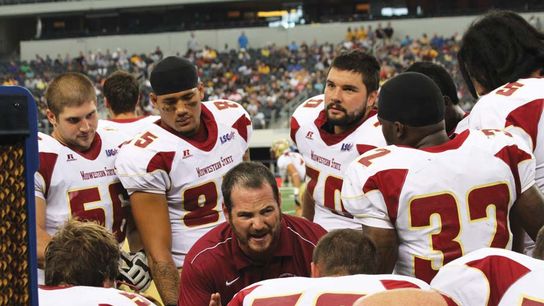Pep talks are an essential part of life, and hold a mythic place in football.
https://www.youtube.com/watch?v=8cHteTe01y0
https://www.youtube.com/watch?v=m_iKg7nutNY
https://www.youtube.com/watch?v=o-iPiN_YHjY
Most leaders never get any formal training in how to motivate those around him, simply relying on what they've seen for training and learning through trial and error.
That's a large part of the job -- especially for football coaches -- to leave untouched and without a plan.
Jacqueline and Milton Mayfield, a married couple who has spent three decades studying pep talks -- or, as they call it in academia, motivating language theory -- for Texas A&M International. Their studies have found that effective pep talks have three components, which they've shared with the Harvard Business Journal:
- Uncertainty-reducing language: This is the "how" of what your team is doing, "giving easily understandable instructions, good definitions of tasks, and detail on how performance will be evaluated."
- Empathetic language: Acknowledging the difficultly or unpleasantness of what you're asking your team to do will make them more willing to accomplish that difficult or unpleasant task. In short, make sure the person or group you're talking to knows you care about them as a person.
- Meaning-making language: Translated from academic-ese back into football-ese -- the "why." Why the task in front of you is important. Why is it important that you do this drill? Why is important that your graduate assistants stay late to break down that film?
The Mayfields' research has been cross-checked with sports psychologists and military historians. In fact, here's one sports psychologists's own research findings on the importance of effective pep talks:
Tiffanye Vargas, a sports psychology professor at California State University at Long Beach, has published a half-dozen lab and field studies exploring which types of speeches best motivate athletes in different situations, some of which may also be applicable to business contexts. Her research suggests that across a variety of sports, coaches’ pregame remarks do matter: 90% of players say they enjoy listening, and 65% say the speeches affect the way they play. She’s found that people prefer an information-rich (uncertainty-reducing) speech if they’re playing an unknown opponent or a team to which they’ve narrowly lost in the past. (For example: “We’re going to beat this team with tough man-to-man coverage. Joe, your job is to neutralize that shooting guard; Jimmy, you box out that star rebounder on every play.”) If a team is an underdog or playing in a high-stakes game, a more emotional pep talk (with more empathetic and meaning-making language) is more effective. (For example: “We’ve exceeded all expectations in this tournament. No one expects us to win. But I expect you to win. I know you can win. You have to win. For your teammates, for the fans—because you deserve this victory.”)
So the next time you need to motivate your players or your assistants -- or a group or 1-on-1 -- remember to explain the "how" and the "why" of what you need them to do, and make sure they know you care about the "who" of is being asked to accomplish that task.
Or you can just watch Herb Brooks and mimic him.
https://www.youtube.com/watch?v=tdmyoMe4iHM
